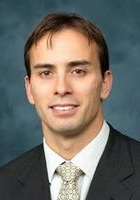Congenital Cardiac Surgery Fellowship
Congenital Cardiac Surgery fellows participate in all aspects of preoperative, intraoperative and postoperative care of surgical patients with graded levels of responsibility depending on their clinical training and expertise. Management of all postoperative patients is under the direction of the congenital heart surgery fellow with supervision by the responsible faculty surgeon; however, a collaborative approach to management is practiced in our Regenstein Cardiac Care Unit, where attending cardiologists are double-boarded in pediatric cardiology and critical care. All decisions regarding patient management are ultimately made and/or approved by the patient’s attending CV surgeon.
Program Goals
At the completion of the program, the fellow will:
- Learn the pathophysiology of congenital heart anomalies
- Learn the fundamentals of cardiopulmonary bypass in infants and children
- Learn perioperative hemodynamic and ventilator management for pediatric cardiac surgical patients
- Acquire graded responsibility as primary surgeon to perform closed and open congenital heart surgery; for example:
- Atrial septal defect closure
- Ventricular septal defect closure
- Repair of coarctation of the aorta
- Ligation/division of patent ductus arteriosus
- Pacemaker/ICD implantation
- Shunts
- Tetralogy of Fallot repair
- Arterial switch for transposition of the great arteries
- Norwood procedure
- Other neonatal procedures
- Acquire the ability to interpret diagnostic tests specific to congenital heart disease, including echocardiography, angiography, cardiac stress tests, pulmonary function studies and chest imaging
- Acquire the ability to conduct retrospective clinical studies utilizing the existing patient database; optional activities include initiation of research involving clinical outcomes
Clinical Experience
The fellow participates in case review at the weekly combined cardiology/CV surgery conference. At that time, the plan of treatment is assigned for each pending case. The preoperative and postoperative in-hospital care proceeds as described above. Emphasis is placed not only on actual operating room experience but also on interpretation and/or performance of the diagnostic and therapeutic procedures important to the specialty, such as interpretation of cardiac catheterization, echocardiography, pulmonary function and nuclear imaging data as well as hemodynamic and ventilatory management. As the fellows’ skills and abilities allow, they are responsible for operating as primary surgeon in both open and closed procedures. All patients operated on by the cardiothoracic surgical service are under the direct care of the cardiothoracic surgical team. An additional component of the training program is regular outpatient follow-up service, coordinated with the CV Surgery Advanced Practice Nursing staff, which provides a full spectrum of educational exposure.
There is one day per week free from educational and clinical responsibilities, 60 average weekly on-duty hours and call from home only.
| Conference | Frequency | Mandatory or Elective | Session Organizer |
|---|---|---|---|
|
Teaching Rounds |
2x/day |
Mandatory |
CVT Surgery |
|
Catheterization/Surgery Conference |
1x/week |
Mandatory |
CVT Surgery/Cardiology |
|
Grand Rounds |
1 x/month |
Mandatory |
Dept of Surgery |
|
Trauma Rounds |
1 x/month |
Mandatory |
Dept of Surgery |
|
Morbidity & Mortality |
2 x/month |
Mandatory |
Dept of Surgery |
|
Journal Club |
Quarterly |
Mandatory |
CVT surgery |
|
Operating Room Instruction |
1 x/day |
Mandatory |
CVT surgery |
|
Idriss Lecture |
Annual |
Mandatory |
CVT surgery |
|
Baffes Lecture |
Annual |
Mandatory |
CVT Surgery |
|
Department of Surgery Resident’s Day |
Annual |
Mandatory |
Feinberg School of Medicine Dept of Surgery |
Supervision Policy
The Cardiovascular-Thoracic Surgery unit within Lurie Children's serves patients housed within the Regenstein Cardiac Care Unit on the 15th Floor of the hospital. Each day starts at 0700, when the entire team of faculty, students, nurse practitioners, cardiac intensivists and cardiologists meet in the Regenstein CCU for rounds, where daily management of each patient is assessed, discussed and discharge plans are formulated.
Under direct faculty supervision, the fellow is provided with graded responsibility both inmside and outside the operating room. Fellows are expected to demonstrate independent judgment in the acquisition of perioperative management skills and to seek faculty approval of their management plan before the plans are implemented. The fellow has “first-line” patient care responsibility. The fellow must notify an attending surgeon immediately of any change in patient status.
In the operating room, an attending surgeon is physically present for the entire procedure. The fellow is expected to learn appropriate skills needed to operate independently, and the faculty teaches these operations at a rate commensurate with the technical skills of the fellow.
Academic guidance is provided to fellows in daily teaching rounds and through a series of mandatory conferences. A significant portion of teaching occurs in a one-on-one relationship between the attending surgeon and the fellow in the operating room as well as in the preoperative and postoperative phases of patient care.
The performance of the fellow is evaluated by each CV Surgery faculty member quarterly, in addition to quarterly evaluation by cardiology, cardiac anesthesiology, cardiac intensivists and select nursing staff. Online evaluation forms are completed and reviewed by the program director, who formally meets with the resident on an annual basis to discuss the evaluation. If the interim evaluation indicates need for improvement, the program director will meet with the fellow as necessary. At the conclusion of the training program, graduating fellows are asked to evaluate faculty members as well as the program using the online evaluation tool.
Requirements & Eligibility
Applicants must be enrolled in or graduate of an ACGME-accredited standard thoracic surgery or six-year integrated thoracic surgery program.
Application Process
For information about applying for the program, please contact the fellowship coordinator.
Why Northwestern?
 Housestaff training through McGaw Medical Center of Northwestern University provides diverse and challenging clinical experiences and world-class education located in the heart of the beautiful city of Chicago.
Housestaff training through McGaw Medical Center of Northwestern University provides diverse and challenging clinical experiences and world-class education located in the heart of the beautiful city of Chicago.
Watch Our Videos
Contact Us
Brittany Dixon, C-TAGME
Program Coordinator
312-227-5329
Physician-Scientist Training & Resources
We offer a wide range of resources, mentorship opportunities and formal training programs to help our residents and fellows excel as physician-scientists. Explore all of the resources and hear from housestaff who are making research a major part of their career development plans.
